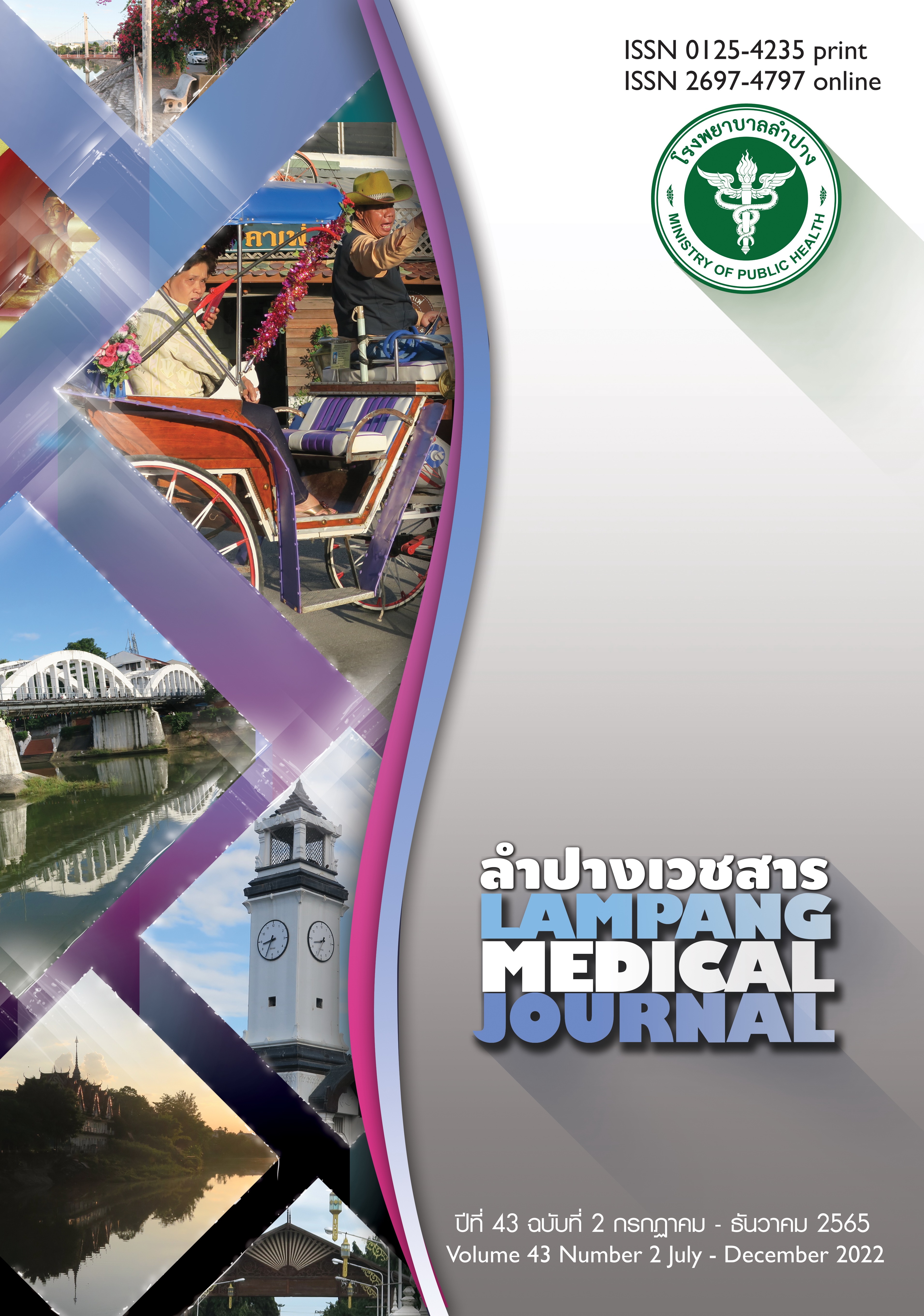Adherence to Immunosuppressive Drugs in Kidney Transplant Recipients and Factors Associated with Adherence
Main Article Content
Abstract
Background: Medication adherence is crucial after organ transplantation. Adherence to immunosuppressive drugs in kidney transplant recipients is lowest among organ transplant patients.
Objective: To evaluate adherence to immunosuppressive drugs among kidney transplant recipients and determine factors associated with adherence.
Material and method: A cross-sectional study was conducted from December 2018 to January 2019 at the kidney transplant clinic, Maharaj Nakorn Chiang Mai Hospital. Kidney transplant recipients were interviewed by clinical pharmacists using the immunosuppressant therapy adherence instrument (ITAS). Data was analyzed using descriptive statistics, and compared between the adherence group (ITAS ≥10) and the non-adherence group (ITAS ≤9) using student t-test, Mann-Whitney U test and Fisher’s exact test.
Results: A total of 224 kidney transplant recipients participated in the study. The mean age was 47.9±14.7 years, of which 146 (65.2%) were male. One hundred and twenty-eight cases (57.1%) were educated below the level of higher education and 180 cases (80.4%) were under the care of a live-in caregiver. The median time of transplantation was 48 months (interquartile range 20-91). Most patients (84.8%) took tacrolimus once daily, followed by prednisolone once daily (63.8%), and mycophenolate sodium more than once a day (61.6%). Based on the ITAS scores, 210 (93.8%) patients had good adherence to immunosuppressive drugs. There was not any different factors between the adherence group and the non-adherence group.
Conclusion: Most kidney transplant recipients (93.8%) had good adherence to immunosuppressive drugs. Specific characteristics related to adherence could not be identified among the factors studied.
Article Details

This work is licensed under a Creative Commons Attribution-NonCommercial-NoDerivatives 4.0 International License.
บทความที่ส่งมาลงพิมพ์ต้องไม่เคยพิมพ์หรือกำลังได้รับการพิจารณาตีพิมพ์ในวารสารอื่น เนื้อหาในบทความต้องเป็นผลงานของผู้นิพนธ์เอง ไม่ได้ลอกเลียนหรือตัดทอนจากบทความอื่น โดยไม่ได้รับอนุญาตหรือไม่ได้อ้างอิงอย่างเหมาะสม การแก้ไขหรือให้ข้อมูลเพิ่มเติมแก่กองบรรณาธิการ จะต้องเสร็จสิ้นเป็นที่เรียบร้อยก่อนจะได้รับพิจารณาตีพิมพ์ และบทความที่ตีพิมพ์แล้วเป็นสมบัติ ของลำปางเวชสาร
References
Abecassis M, Bartlett ST, Collins AJ, Davis CL, Delmonico FL, Friedewald JJ, et al. Kidney transplantation as primary therapy for end-stage renal disease: A National Kidney Foundation/Kidney Disease Outcomes Quality Initiative (NKF/KDOQITM) Conference. Clin J Am Soc Nephrol 2008;3(2):471-80.
Butler JA, Roderick P, Mullee M, Mason JC, Peveler RC. Frequency and impact of nonadherence to immunosuppressants after renal transplantation: a systematic review. Transplantation 2004;77(5):769-76.
Denhaerynck K, Dobbels F, Cleemput I, Desmyttere A, Schafer-Keller P, Schaub S, et al. Prevalence, consequences, and determinants of nonadherence in adult renal transplant patients: a literature review. Transpl Int 2005;18(10):1121-33.
Didlake RH, Dreyfus K, Kerman RH, Van Buren CT, Kahan BD. Patient noncompliance: a major cause of late graft failure in cyclosporine-treated renal transplants. Transplant Proc 1988;20(3 Suppl 3):63-9.
Ganjali R, Ghorban Sabbagh M, Nazemiyan F, Mamdouhi F, Badiee Aval S, Taherzadeh Z, et al. Factors associated with adherence to immunosuppressive therapy and barriers in Asian kidney transplant recipients. Immunotargets Ther 2019;8:53-62.
Hartono JL, Koh T, Lee GH, Tan PS, Muthiah M, Aw MM, et al. Predictors of non-adherence to immunosuppressive therapy in Asian liver transplant recipients.Transplant Proc 2017;49(6):1419-24.
Chisholm MA, Lance CE, Williamson GM, Mulloy LL. Development and validation of the immunosuppressant therapy adherence instrument (ITAS). Patient Educ Couns 2005;59(1):13-20.
Chisholm-Burns M, Pinsky B, Parker G, Johnson P, Arcona S, Buzinec P, et al. Factors related to immunosuppressant medication adherence in renal transplant recipients. Clin Transplant 2012;26(5):706-13.
Chisholm-Burns MA, Spivey CA, Wilks SE. Social support and immunosuppressant therapy adherence among adult renal transplant recipients. Clin Transplant 2009;24(3):312-20.
Garcia MFFM, Bravin AM, Garcia PD, Contti MM, Nga HS, Takase HM, et al. Behavioral measures to reduce non-adherence in renal transplant recipients: a prospective randomized controlled trial. Int Urol Nephrol 2015;47(11):1899-905.
Promraj R, Dumronggittigule W, Sirivatanauksorn Y, Ruenrom A, Tovikkai C, Limsrichamrern S, et al. Immunosuppressive medication adherence in liver transplant recipients. Transplant Proc 2016;48(4):1198-201.
Noppakun K, Ingsathit A, Pongskul C, Premasthian N, Avihingsanon Y, Lumpaopong A, et al. A 25-year experience of kidney transplantation in Thailand: Report from the Thai Transplant Registry. Nephrology 2015;20(3):177-83.
Sornhiran P, Ingsathit A, Phakdaeekitcharoen B, Sumethkul V, Kantachuvesiri S, Arpornsujaritkun N, et al. Effect of medication adherence on renal allograft outcome in postkidney transplant patients. Journal of the Nephrology Society of Thailand 2022;27(3):68-81.
World Health Organization. Adherence to long-term therapies: evidence for action. Geneva. 2003.
Chapman JR. Compliance: the patient, the doctor, and the medication? Transplantation 2004;77(5):782-6.
Kuypers DR, Peeters PC, Sennesael JJ, Kianda MN, Vrijens B, Kristanto P, et al. Improved adherence to tacrolimus once-daily formulation in renal recipients: a randomized controlled trial using electronic monitoring. Transplantation 2013;95(2):333-40.
Myaskovsky L, Jesse MT, Kuntz K, Leino AD, Peipert JD, Russell CL, et al. Report from the American Society of Transplantation Psychosocial
Community of Practice Adherence Task Force: Real-world options for promoting adherence in adult recipients. Clin Transplant 2018;32(9):e13353


